Do you have to study but watching funny cats on TikTok seems more interesting? It’s time to change that! With these 15 proven strategies to stop procrastinating while studying, you’ll be able to develop a laser focus on your studies and feel the satisfaction of passing your exams with flying colors.
PIN THIS POST TO READ IT LATER:

DISCLAIMER
This post may contain affiliate links, which means I’ll receive a commission if you purchase through my links, at NO extra cost to you. Read my Disclaimer for more information. Hope you find this post useful!
- How To Stop Procrastinating While Studying
- Have A Brain Dump
- Set Your Goals
- Organize Your Week
- Increase Your Energy Levels
- Divide Tasks
- Choose The Right Study Location
- Tidy Up Your Desk
- Remove All Distractions
- Take Breaks And Reward Yourself
- Don’t Think It Too Much
- Use A Timer
- Utilize ‘Study With Me’ Videos
- Make It Fun
- Use A Vision Board
- Surround Yourself With The Right People
- FAQ’S
- Wrapping Up: How To Stop Procrastinating While Studying
How To Stop Procrastinating While Studying
We’ve all been there.
Exams are approaching and we can’t get serious about studying.
And when we do get down to work, we get tempted to check Instagram and five innocent minutes on the platform turn into five hours of scrolling non-stop.
And frustration sinks in.
You don’t have to go through this!
Fortunately, there are ways to improve your focus.
If you want to learn how to stop procrastinating while studying, apply these 15 proven strategies to develop good study habits and get addicted to learning!:
1. Have A Brain Dump
2. Set Your Goals
3. Organize Your Week
4. Increase Your Energy Levels
5. Divide Tasks
6. Choose The Right Study Location
7. Tidy Up Your Desk
8. Remove All Distractions
9. Take Breaks And Reward Yourself
10. Don’t Think It Too Much
11. Use A Timer
12. Utilize ‘Study With Me’ Videos
13. Make It Fun
14. Use A Vision Board
15. Surround Yourself With The Right People
Remember that you can always get professional support to get rid of your procrastination habits faster. I highly recommend ONLINE THERAPY for its outstanding service and warm-hearted professionals. Get 20% OFF your first month with my special link!
Have A Brain Dump
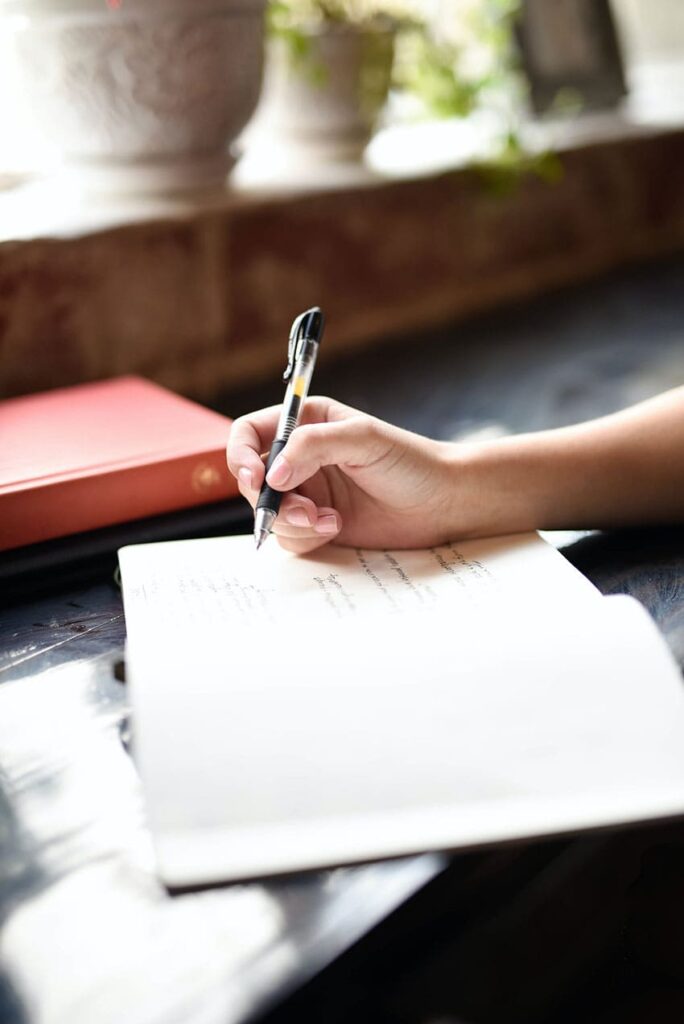
First things first, grab a pen and a piece of paper and start writing what your desired outcome is, what you have to do to achieve it, what are the things that are making you procrastinate, how you feel about it—everything!
Write as you think.
Don’t edit.
The idea behind this is just pouring all your thoughts into your notebook to free up mental space.
This will help you get clear about what you want and analyze where you are standing.
Benefits of a brain dump
- Helps manage anxiety
- Eliminates overthinking
- Increases self-awareness
- Fosters productivity
- Helps you express thoughts without judgment
Done? Now it’s time to make a plan.
Set Your Goals
Now it’s time to draw up the actual plan.
The key here is to be as specific as possible with your goals.
Include the following points:
- What’s the subject?
- How many pages?
- By when?
- How many hours per day?
- With what study method?
- Why are you setting the goal?
For example, you could write something like:
‘I will study for Biology, chapters 6-12, from page 100 to 181, and will have it ready by September 15th. I will study 4 hours per day using diagrams and summaries. This will help me pass the exam I’ll have on October 2nd.’
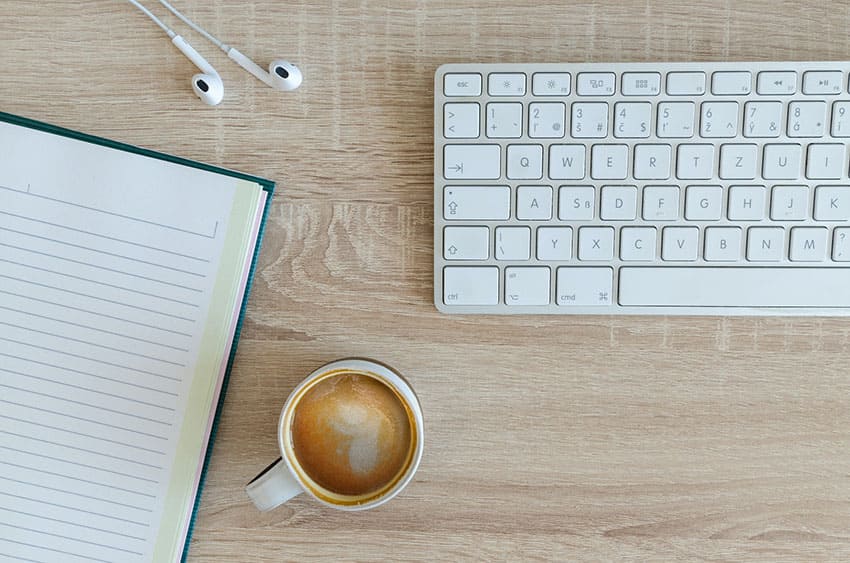
When we write down our goals, it’s easier to hold ourselves accountable and commit to our studies.
Just make sure to set a realistic goal, something that you can achieve in the time you have available.
RELATED POSTS:
- How To Stop Procrastinating On Your Goals By Using The Seinfeld Strategy? [ANSWERED]
- Why Do I Procrastinate Taking a Shower? [ANSWERED]
- How To Stop Procrastinating Working Out: 16 Fitness Motivation Tricks That Actually Work!
- Why Do I Procrastinate Eating? [+ 9 Useful Tips To Overcome It!]
- How To Stop Procrastinating While Studying With 15 Proven Strategies
Organize Your Week
Now it’s time to plan your week.
You want to dedicate time to your studies, but you don’t want to suffer burnout (this kills your productivity).
That’s why you have to schedule your week in a way that you can do all your activities, including your studies and your personal life (such as being with family and friends, running errands, going to the gym).
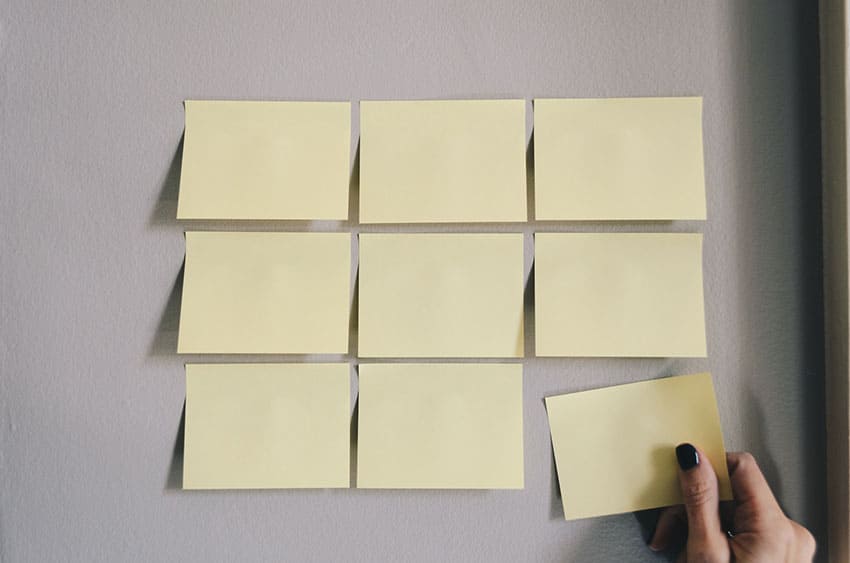
In my case, I always dedicate three hours per day to my studies.
If I dedicate more time, it’s easy to get exhausted and lose my focus.
What’s YOUR ideal study schedule?
The idea is to make studying part of your daily routine while honing your time-management skills.
You will soon notice that getting down to your studies will become automatic.
Increase Your Energy Levels
A brain without fuel can’t work properly.
If you want to study like a pro, you’ll have to have the energy to focus and learn faster.
As a rule of thumb, get enough sleep.
I know that sometimes it’s not possible to get 8-9 hours of sleep but try to develop the discipline to have a good night’s sleep.
This is crucial for concentration.
If you are there all sleepy and sluggish, studying becomes a nightmare.

Take power naps of 20 minutes between study blocks.
This will also help to regain energy and come back to your studies feeling refreshed.
Finally, get used to exercise each day!
A short, 20′ workout should do.
In fact, exercise has lots of benefits for students:
- Boosts your memory
- Improves your cognitive skills
- Helps you concentrate
- Maintains healthy energy levels
- Pumps up endorphins that make you happy
- Builds resilience
Taking a walk, doing yoga, or practicing aerobics at home are effective ways of reaping all these benefits.
Pair this with nutrition-packed meals and BOOM, there you have the perfect combo to get laser-focused on your studies (avoid fast food at all costs!! 💀).

Divide Tasks
‘Divide and conquer’.
Remember that saying?
This is the smart way of tackling your studies.
Instead of saying ‘Today, I’ll study Chapter 12’, which can seem a little overwhelming if the chapter is too long and tough, try scheduling your study hours by subheadings.
That way it will feel more satisfying every time you reach a new subsection.

As with everything, dividing a big task into smaller milestones will keep you motivated and organized, with the focus you need to make progress.
Otherwise, you’ll feel that you can manage the activity and you’ll end up procrastinating and quitting again.
Choose The Right Study Location
If you think that you can’t get the motivation you need to study, why not try switching the study location?
There are plenty of places you can choose from to get down to your studies:
- Your dining room
- Your living room
- Your backyard
- The Library
- The book store
- Your favorite coffee shop
- An empty classroom
- Campus common space
- The park
The ideal study spot is a quiet and peaceful place, with wifi, low music, or some ambient noise.

What I recommend is to pick one that is suitable for your personal preferences and stick to it, to study there at the same hour.
Personally, I love to study at Starbucks: the place is cozy, there’s jazz music, and I can sip my beloved Caramel Macchiato while reading my notes.
However, there are people who prefer noisy places to study.
It seems that they get more focused in locations like these, but it’s totally up to you where you choose to prepare for exams!
Tidy Up Your Desk
A messy desk is a total turn-off for students.
Who on Earth would want to study at a desk full of notes, stacks of paper, old sticky notes, pens, and markers everywhere, and even dirt on the surface?
If you want to stop procrastinating while studying, your desk should be impeccable.
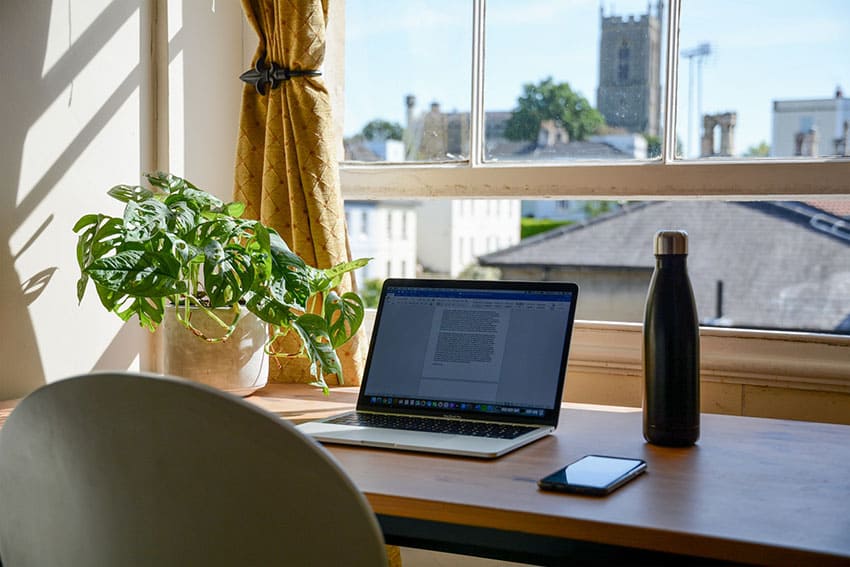
Steps To Tidy Up Your Desk
1. Begin by removing all things from the desk. Your desk should be empty.
2. Spray some alcohol on the surface and wipe it down with a cloth. Clean your desk drawers too.
3. Disinfect your computer, your mouse, your keyboard, and your chair.
4. Place only what you need on the desk (laptop, notebook, sticky notes, markers).
5. Use a pen holder to keep your pens and markers in one place.
6. Use a board to pin important notes.
7. Digitalize as much as you can. Keep a trash bin near you anyways to avoid clutter.
8. Use desk drawer organizers to keep items accessible.
9. You can get a tray to store your papers.
10. Avoid eating at your desk.
Remove All Distractions
One of the things that make me procrastinate the most while studying is having access to social media and WhatsApp.
If I dare to scroll for a few minutes, I totally lose the sense of time and I can easily spend hours checking messages and Instagram.
This kills my progress.
If your phone is one of your weak points like in my case, put it on flight mode and block apps with BlockSite.

Apart from checking apps, there are other distractions to avoid while studying:
- Family and friends: Tell them you are going to study so that they know they should not disturb you or call you (this is not a good time to go out to a party!)
- Being hungry: Feeling hungry is the perfect excuse to procrastinate in the kitchen. To avoid this, have some snacks prepared beforehand to save time (fruit salad, yogurt with granola, banana bread, crackers with hummus).
- Noise: If you can’t have access to a quiet place to study, invest in noise-cancellation headphones to focus even in the most noisy environments.
- Disorganization: Allocate time for study, breaks, and personal life, and keep your study place tidy to avoid visual clutter.
Take Breaks And Reward Yourself
Studying for hours and expecting to have the same level of performance after four hours of hitting the books is not realistic at all.
In fact, human beings can remain focused on a task for 90-120 minutes; after that, we need to unplug.
With this in mind, it’s smart to have 30-minute breaks after 90 minutes of study to improve your productivity.
There are students who even study in bursts of 25 minutes and take 5-minute breaks to recover their energy (the Pomodoro technique).
Personally, I like to study for 90 minutes and then reward myself to come back to my studies feeling refreshed.

These are some self-reward ideas to unplug during your breaks:
- Going for a walk in nature
- Eating your favorite snack
- Taking a relaxing bath
- Petting your dog/cat(s)
- Passing quality time with family
- Meditation
- Listening to your favorite podcast
- Window-shopping
- A power nap
Self-rewards will help you connect your studies to something positive, which is crucial to keeping the motivation to study the next time you come back to your books.
Just make sure to remain disciplined and do not resort to WhatsApp, YouTube, Instagram, or Netflix because these are too addictive.
Don’t Think It Too Much
The problem with procrastination is that it causes us to go down a spiral of overthinking and doubt.
So, if you know that study time is approaching, go straight to your room and get down to work without even giving your brain time to make up excuses.
This applies to any activities you don’t like to do, like taking showers.
Sometimes, the best solution to do things you hate is just…Doing them.
Take full responsibility and eat the frog.
Do it before any other activities that are easier and more enjoyable.
Tackling more challenging tasks first will help you set yourself up for success for the rest of the day and use all your brain power to complete tasks that matter most.
Use A Timer
I’m a HUGE fan of timers.
What I like about them is that they give you the sense of urgency you need to make progress.
Studying without knowing how much time has passed is way less effective than setting your timer and adjusting your study speed to the time available to achieve a particular goal.
It forces you to give your best and pay attention.

You can use your timer according to your personal preferences.
As mentioned before, I set my timer for 90 minutes and then I rest for 30 minutes.
Others set their timer for 25 minutes and rest for 5 minutes.
Use whatever technique is best for you.
I even use it to do the cleaning at home!
Utilize ‘Study With Me’ Videos
Sometimes we need to feel supported when studying.
If you don’t have access to a study group or just don’t feel like socializing, you can try studying while playing a ‘Study With Me’ video in the background.
These videos feature people studying for their exams in their rooms or at a cafe, with no talking, only background noise.
Usually, these videos are very aesthetic and help you focus thanks to your digital study buddies.
Personally, I like the ‘Study With Me’ videos from Merve, like this one, and from Heidi West, like this one.
But choose whatever video you like; YouTube is flooded with this kind of content.
Make It Fun
If you are wondering how to stop procrastinating while studying, the best way to get around this is to make it fun!
This is key if you want a new habit to stick.
For starters, let your favorite music play in the background.
Sometimes, when something seems boring to us, our mind tends to wander and lose focus.
Mood-boosting music is the extra stimulation your brain needs to avoid this and increase your productivity.
And, this goes even without saying, but… Wear comfy clothes!

I don’t know about you, but I HATE studying in jeans!
If I’m going to spend some hours sitting on the chair or the couch, my sweatpants are my go-to option.
Another recommendation to make studying more interesting is using cute markers and notepads and getting some cool gadgets!
These are my favorite study supplies and gadgets:
- Pastel markers
- Peony Pink Timer
- Post-It flags
- Cellphone stand
- Laptop stand
- LED arm lamp
- Spiral notebooks
- Mini printer – Sticker maker
- Cute wireless keyboard
Use A Vision Board
One thing is fantasizing about your goals, and another thing is having them on a board to “see” them every day.
It’s extremely powerful.
This is because a vision board makes your brain think the end results you want are already a reality.
It helps you stay on track and visualize your success.
So, how to make one?
Get a cheap grid and clips from your nearest craft store and add photos that represent your goals.
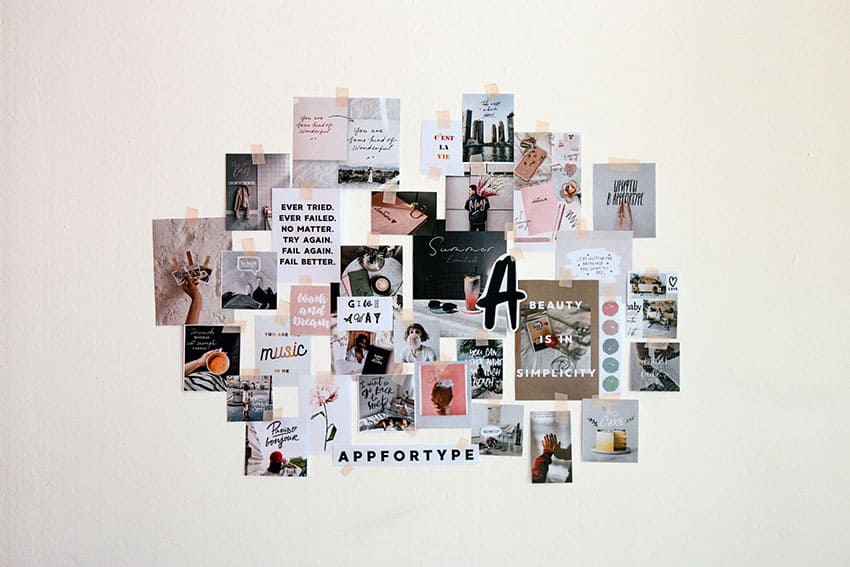
It could be photos depicting +A grades, motivational quotes, aesthetic study rooms, and, why not?, a beautiful destination to celebrate after passing your exams.
Then hang your vision board where you will see it often, like your desk.
When you feel bored, see your vision board.
You’ll get back your motivation in less than a second.
It works wonders if you want to learn how to stop procrastinating while studying.
Surround Yourself With The Right People
One of the factors that weighs heavily in your success is your social circle.
The motivational speaker Jim Rohn once said: ‘You are the average of the five people you spend the most time with.’
And this is so true.
If you surround yourself with people who give a da*m about studies, it’s very likely to end up partying with them and getting low grades.
You don’t want to get distracted.
Instead, surround yourself with responsible, dedicated students and your productivity will skyrocket.
That’s what happens when you hang out with people who respect your goals and your time!

FAQ’S
Why Is Procrastination Bad For Studying?
Procrastination is bad for studying because it makes you fall behind and this ends up affecting your grades and your general academic performance.
What’s more, when deadlines are approaching, you try to catch up at the last minute, which leaves you all stressed out and frustrated.

Apart from the low self-esteem caused by failed exams or poor results, procrastination also means that you will miss exciting events that you’d be able to attend if you had better time-management skills.
The worst consequence of procrastination is dropping out of college.
Remember that you can always get professional support to get rid of your low self-esteem and procrastination habits. I highly recommend ONLINE THERAPY for its outstanding service and warm-hearted professionals. Get 20% OFF your first month with my special link!
How Can I Increase My Study Speed?
You can increase your study speed by using these methods:
- Take notes by hand: It’s scientifically proven that you can memorize faster on paper than digitally.
- Use summaries: Using summaries and diagrams helps you visualize keywords more clearly. They only contain key ideas. I always make the summary of the summary of the summary (no, I didn’t repeat words; I actually do make those summaries and it works!!).
- Say it out loud: Pretending to teach a subject to someone is extremely useful for learning faster. Don’t worry; we all felt it was weird when we did it the first time!
- Interlink ideas: Associating ideas helps you understand the topic as a whole and memorize it faster.
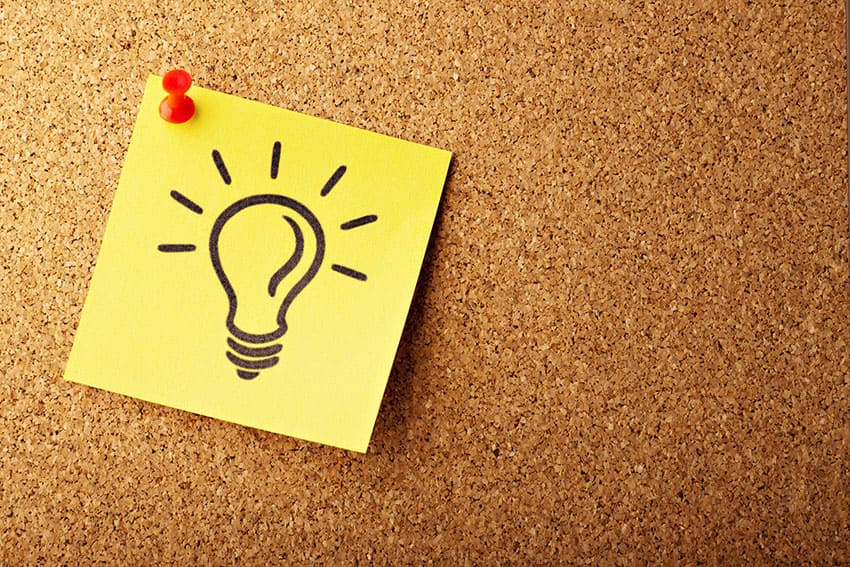
- Re-read your notes: After taking notes, take a pause, have a break, and then go back to them. Re-reading them several times makes them stick.
- Use sticky notes: Mark important pages or passages, leave additional notes, write short questions and answers, use them as labels, reminders, or for to-do lists, and mark study sections in a book.
- Try aromatherapy: Essential oils like peppermint or rosemary improve your focus and memory.
- Improve your time-management skills: Getting organized and setting a routine to study within a specific deadline helps you achieve your study goals with ease.
How Many Hours Of Study Is Best?

Although it may vary from person to person, studying for 3 hours on a set schedule and during your most productive time of the day allows your brain to learn faster.
Forget about studying for more than five hours.
This is the easiest way of getting burned out and losing all the information learned during your brain’s ‘peak hours’.
If you want to maintain a healthy study habit, study for 3-4 hours, stay hydrated, take breaks, and get enough sleep to recover.
What Is The Best Studying Method?
As regards studying methods, they come in plenty of shapes and sizes.
If you’re looking for the best studying method, pick your favorite below and stick to it!:
The SQ3R method: Skim the chapter, formulate questions, read the chapter, answer your questions, summarize them, and review your notes.
Spaced practice: Learn the information on the first day and then review your notes on the second day, the third day, after one week, and finally after two weeks.
The Feynman Technique: Write a summary of your study material using the most simple words as if you were trying to teach someone totally new to the subject.

Mind Mapping: Write the concept of the chapter as one phrase in the center of a blank page. Then you connect that concept to keywords and those keywords to additional ideas, like the branches of a tree.
Color-coding: Take down notes and then mark key ideas with one specific color and important ideas with another color to stick concepts into your head visually.
Active recall: It basically entails testing yourself without reviewing your notes. It forces you to retrieve information from scratch when you formulate questions about your study material. After answering them, you can go check your chapter to validate your ideas.
Wrapping Up: How To Stop Procrastinating While Studying
So there you have it!
This post was all about how to stop procrastinating while studying.
Do you have any other recommendations to study faster and stay motivated?
Feel free to leave them in the comments section below.
And remember: it all comes down to studying smarter, not harder!

DON’T FORGET TO PIN AND SHARE THIS POST!:




Leave a Reply